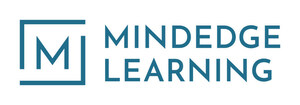New Study: Nearly Half of Millennials Struggle With News Literacy and Critical Thinking
MindEdge Learning research finds 64 percent of millennials believe critical thinking is "very important" to future job prospects . . . but only 35 percent are confident in their skills
BOSTON, May 10, 2017 /PRNewswire/ -- The ability to identify fake news and other false information has never been more important. That makes critical thinking skills a must – yet according to new national study from edtech firm MindEdge Learning, millennials struggle in this area. The study, commissioned by MindEdge and conducted by Research Now, probed the attitudes of 1,000 millennials who are currently in college or are recent graduates. The goal of the research was to evaluate this group's critical thinking skills and determine whether they're able to separate fake news from factual information. The results were not promising: 44 percent of respondents received a relative 'F' when it comes to these skills.
Given the fact that 55 percent of millennials receive news through social media and 51 percent share news through social media, the ability to accurately filter facts is a necessity. Yet, according to the research, only 36 percent of those surveyed feel they are very well-trained in this area. The reach and impact of this issue is made clear by the fact that 37 percent of respondents admitted to sharing inaccurate information on social media.
"These findings have significant ramifications, not only for the current fake news epidemic we're facing, but also for millennials' long-term success," said Frank Connolly, a senior editor at MindEdge who oversaw the research. "By 2020, the World Economic Forum anticipates critical thinking will be the second most important skill to exhibit, second only to complex problem solving. Our research finds that the current state of critical thinking among millennials – the largest and most connected generation yet – is lacking in a big way, and now is the time to address the issue."
Here are some key takeaways from the study:
Millennials struggle to identify false content online
As part of the study, respondents took a basic, nine-question critical thinking test. The results found that many millennials are deficient in this area, with only 24 percent able to correctly answer eight to nine questions designed to gauge respondents' ability to detect false or misleading content. This poor performance is not surprising given the fact that only about one-third of respondents (36 percent) feel confident they are very well-trained in this area. Those who took the survey reported that their peers are even less versed in this area, with only 20 percent of respondents describing their colleagues as very well-trained in critical thinking skills.
Millennials don't feel their college education provided them with the skills they need to compete in the job market
While three out of five respondents (61 percent) report having studied critical thinking in college, another 13 percent were unsure if they had received any formal training in this area. Regardless of any relevant course work, only about one in three are very confident in their ability to identify false information. Almost half (46 percent) claim that critical thinking skills in assessing the accuracy and reliability of websites and online content are very important, while two-thirds (64 percent) say that critical thinking skills will be or are very important to their future job prospects.
Lack of news literacy leads to the spread of false information
The lack of confidence in critical thinking abilities also has crucial ramifications for the spread of inaccurate information by millennials via social media:
- More than half of the surveyed consumers (55 percent) rely on social media for news.
- Half of those surveyed share online content very/fairly often (51 percent).
"We see a silver lining in what are clearly disturbing findings," said Jefferson Flanders, CEO of MindEdge. "Our key academic partners recognize this challenge and we've been working with them to incorporate digital literacy and critical thinking skills across the curriculum. Students can sharpen their critical thinking and can be better prepared for their civic and professional futures."
About the Methodology
MindEdge's Critical Thinking Study was conducted online during the first two weeks of April 2017. The sample included 1,002 U.S. residents ages 19 to 30. The survey's margin of error is +/- 3.1 percent.
About MindEdge
MindEdge, a learning company based in Waltham, provides leadership, management, communication and educational solutions for organizations to help them meet their objectives. Founded in 1998 by Harvard and MIT educators, MindEdge specializes in higher education and professional development content and technology solutions and continues to innovate in the rapidly changing landscape of online education. The company's webtexts feature narrative, interactive learning case studies and simulations, as well as adaptive learning technology to maximize learner mastery of the content.
Media Contact
Sally Brown
InkHouse (for MindEdge)
[email protected]
SOURCE MindEdge
WANT YOUR COMPANY'S NEWS FEATURED ON PRNEWSWIRE.COM?
Newsrooms &
Influencers
Digital Media
Outlets
Journalists
Opted In



Share this article